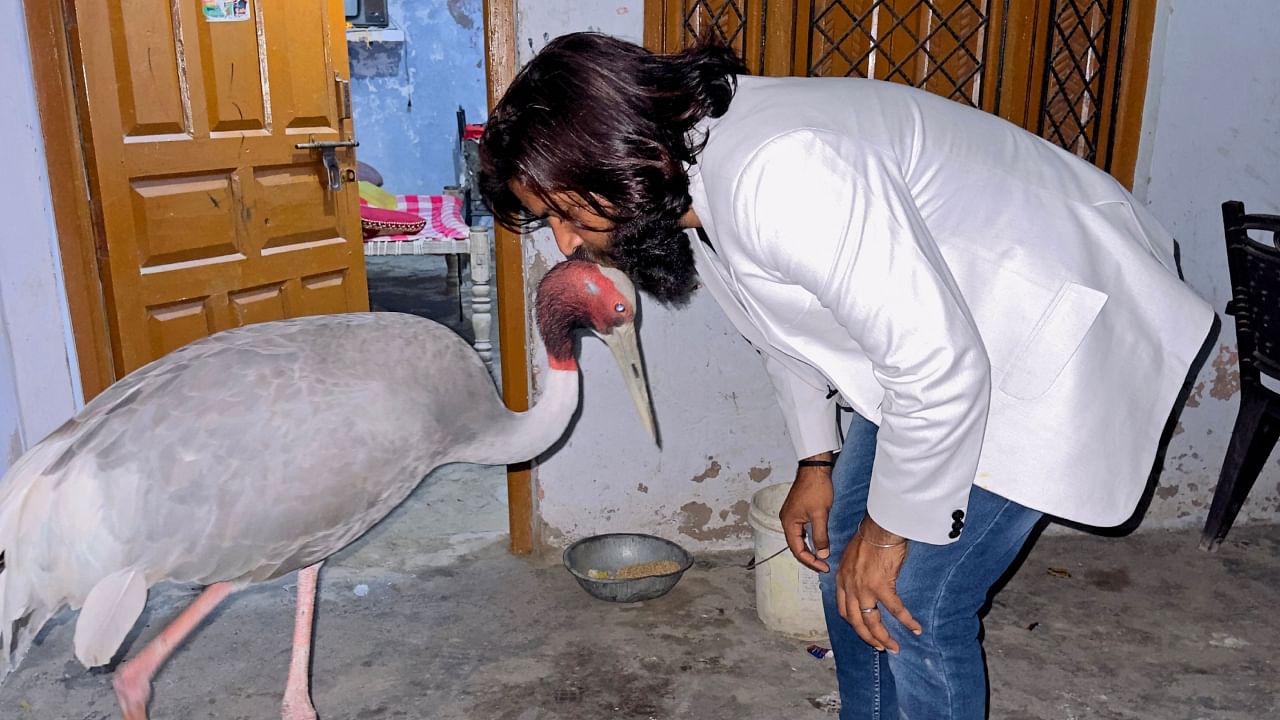
On April 11, three weeks after officials in Uttar Pradesh forcibly took away the wild sarus crane Mohammed Arif had found injured and made well again, the farmer was allowed to see the bird briefly at the Kanpur Zoo.
The crane, whom Arif had left free, is now locked up in a cage at the zoo. In a video of the encounter, the bird jumps about excitedly, with flapping wings, happy to see the man who saved the bird’s life, and likely believing that Arif had come to the rescue again. However, the logic given by the State officials to keep the bird under its watch is hard to follow. They have taken a wild bird over concerns regarding captivity — which wasn’t even the situation — and put the animal in captivity.
Arif provides an example of how humans should behave. A year ago, when he found the injured crane in his village in Amethi district, he performed a humanitarian act, nursing the bird back to health. After recovering, the crane was free to fly away, and did so, but would often return and hang out with Arif, ever grateful to him for a new lease on life.
Media coverage of this touching story ultimately resulted in this free bird being captured and transferred to a cage in the Kanpur Zoo. Officials claimed the move was made for wildlife protection, but jailing a crane who was free obviously deprives that animal of freedom, crushing the bird’s spirits and condemning this individual to frustration and loneliness — unable to socialise or mate.
It gets worse: sarus cranes are known to pine for the loss of their partners to the point of starvation. Of course, what the crane feels for the farmer is likely gratitude and platonic love, but the feeling is clearly intense. So, in the supposed best interests of the crane, and ‘conservation’, must the bird suffer?
A zoo is no place for anyone, not even animals unfortunate enough to be born into them. Even animals who know no other life often deteriorate psychologically, and physically in bleak zoo cells. Many exhibit abnormal behaviour indicative of neurosis, like endless circling, pacing, head bobbing, swaying, weaving, vomiting, and so on. We can only imagine then how a wild bird feels to be suddenly torn away from a loved one and caged. In contrast, Arif never has, and insists he never would, cage the crane.
This bird was reportedly seized because it was felt that living in a natural environment would be best. The bird was already in a natural environment near Arif’s home. After all, that’s where the bird was found when injured. A zoo is certainly not a ‘natural environment’. Now, shockingly, there seems to be no plan to free the bird. Zoo officials told a media outlet that they plan to move the bird to another cage. For what? A zoo enclosure cannot compare with the open sky.
The crane should be returned to the area where the animal was found, and that Arif should be counselled about how to let this wild animal prosper in nature. For instance, concerns about feeding the bird human food, which have been raised, could easily be assuaged by phasing out that kind of food. The crane was already living in nature when found, and knows very well how to find food and water, and to survive and thrive.
Breaking a crane’s heart is not conservation, and neither is moving the bird from place to place or confinement in a zoo (whether temporary or permanent). It is hoped that the crane’s love story with the farmer will be allowed to continue, now under the guidance of forest authorities, until the bird decides to fly away for good.
(Poorva Joshipura is director, People for the Ethical Treatment of Animals (PETA) India.)
Disclaimer: The views expressed above are the author's own. They do not necessarily reflect the views of DH.